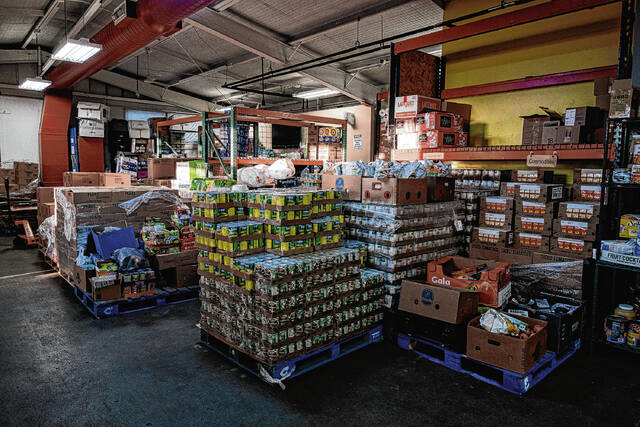
Mike Wolanin | The Republic Food items sit on pallets and shelves at the Love Chapel Food Pantry in Columbus, Ind., Tuesday, Oct. 26, 2021.
Nearly $50,000 in federal funds will be used to supplement emergency food and shelter programs to disadvantaged individuals and families in Bartholomew County.
A total of $48,180 has been awarded in the latest phase of the American Rescue Plan Act. The amount being received in Columbus and surrounding areas was determined by a national panel chaired by the U. S. Department of Homeland Security and the Federal Emergency Management Agency.
Both of these federal agencies are acting under the Emergency Food and Shelter National Board Program.
Federal officials will leave it up to a local board to recommend what agencies should receive these funds, as well as any additional monies that may become available through the program.
The local board consists of representatives from the United Way of Bartholomew County, the Southeast Indiana Chapter of the American Red Cross, Columbus Township Trustee Ben Jackson, the Jewish community, the Columbus Salvation Army, the Ecumenical Assembly at Love Chapel, and Human Services Inc.
Under the terms of the grants, qualifying local agencies chosen to receive funds must:Be private and voluntary nonprofits or units of government
Be eligible to receive federal funds
Have an accounting system practice
Have demonstrated a record of nondiscrimination
Demonstrated the capability to deliver emergency food and/or shelter programs.
Have a voluntary board of directors if they are a private voluntary organization
In the past, Bartholomew County has distributed Emergency Food and Shelter funds to Community Center of Hope, Human Services, Su Casa Columbus and Turning Point Domestic Violence Services participating. These agencies were responsible for providing client assistance and emergency nights of shelter.
The grant comes at a time when it is most needed. Due to inflation, the economy and COVID-19-related, local food banks have been struggling to meet the needs of their clients. At the same time, supply chain issues have diminished the amount of food provided by corporate donors.




